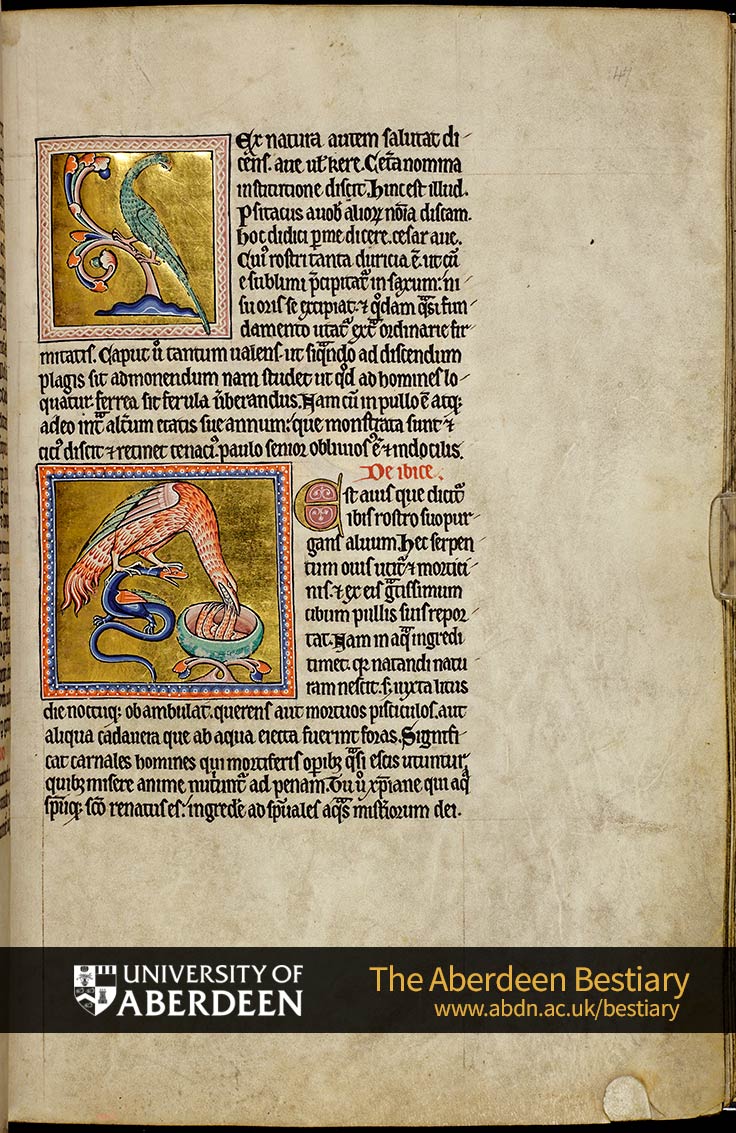Folio 47r - the parrot, continued. De ibice; Of the ibis.
Characteristically, it greets you by saying in Latin or Greek: 'Ave' or 'Kere!' - 'Hail!' It will learn other words if you teach it. Which explains the lines: 'Like a parrot, I will learn other people's names from you, but this I have learned by myself to say: Hail, Caesar!' (Martial, Epigrams, 14, 73).
The parrot's beak is of such hardness that if it falls from a height on to a rock, it takes the impact on its mouth, using it as base of uncommon toughness.
Its skull is so thick, that if ever you have to admonish it with blows to learn - for it tries hard to speak like men - you should beat it with an iron rod. For when it is young, up to two years of age, it learns what it is told very quickly and keeps it firmly in mind; when it is a little older, it is forgetful and is difficult to teach.
Of the ibis
There is a bird called the ibis; it purges its stomach with its beak. It feeds on the eggs of snakes and on carrion, and from them carries back food to its young, which they eat with great pleasure. Yet it fears to go into water, because it does not know how to swim, but walks about near the shore day and night, looking for dead fish of a small size or corpses which have been washed up.
The ibis signifies carnal men who feed, as it were, on deadly deeds, on which they nourish themselves to the condemnation of their wretched souls.
But you, a Christian, reborn by water and the holy spirit, enter the spiritual waters of the mysteries of God
- Commentary
-
Commentary
Text
The parrot has a hard beak and a tough skull. The ibis regurgitates snakes' eggs and carrion to feed its young.
Illustration
the parrot is correctly painted in green and red, perched on a branch. The Indian rose-ringed parakeet was the only member of the parrot family known in Europe in the middle ages. The ibis regurgitates food to its young and holds a snake (not the snake's egg mentioned in the text) in its claw. The text refers to the sacred ibis which lives at the water's edge. However it eats insects, not carrion. Initial type 2.
Folio Attributes
- Transcription and Translation
-
Transcription
Ex natura autem salutat di\ cens ave vel kere. Cetera nomina\ institutione discit. Hinc est illud.\ Psitacus a vobis aliorum nomina discam:\ Hoc didici per me dicere: Cesar ave.\ Cuius rostri tanta duricia est, ut cum\ e sublimi precipitatur in saxum, ni\ su oris se excipiat, et quodam quasi fun\ damento utatur extra ordinarie fir\ mitatis. Caput vero tantum valens, ut siquando ad discendum\ plagis sit admonendum nam studet ut quod ad homines lo\ quatur, ferrea sit ferula verberandus. Nam cum in pullo est atque\ adeo intra alterum etatis sue annum, que monstrata sunt et\ cicius discit et retinet tenacius, paulo senior obliviosus est et indocilis.\ De ibice \ Est avis que dicitur\ ibis rostro suo pur\ gans alvum. Hec serpen\ tum ovis utitur et mortici\ nis, et ex eis gratissimum\ cibum pullis suis repor\ tat. Nam in aqua ingredi\ timet, quia natandi natu\ ram nescit, sed iuxta litus\ die noctuque obambulat, querens aut mortuos pisciculos, aut\ aliqua cadavera que ab aqua eiecta fuerint foras. Signifi\ cat carnales homines qui mortiferis operibus quasi escis utuntur\ quibus misere anime nutriuntur ad penam. Tu vero Christiane qui aqua\ spirituque sancto renatus es, ingredere ad spirituales aquas misteriorum dei,\Translation
Characteristically, it greets you by saying in Latin or Greek: 'Ave' or 'Kere!' - 'Hail!' It will learn other words if you teach it. Which explains the lines: 'Like a parrot, I will learn other people's names from you, but this I have learned by myself to say: Hail, Caesar!' (Martial, Epigrams, 14, 73). The parrot's beak is of such hardness that if it falls from a height on to a rock, it takes the impact on its mouth, using it as base of uncommon toughness. Its skull is so thick, that if ever you have to admonish it with blows to learn - for it tries hard to speak like men - you should beat it with an iron rod. For when it is young, up to two years of age, it learns what it is told very quickly and keeps it firmly in mind; when it is a little older, it is forgetful and is difficult to teach. Of the ibis There is a bird called the ibis; it purges its stomach with its beak. It feeds on the eggs of snakes and on carrion, and from them carries back food to its young, which they eat with great pleasure. Yet it fears to go into water, because it does not know how to swim, but walks about near the shore day and night, looking for dead fish of a small size or corpses which have been washed up. The ibis signifies carnal men who feed, as it were, on deadly deeds, on which they nourish themselves to the condemnation of their wretched souls. But you, a Christian, reborn by water and the holy spirit, enter the spiritual waters of the mysteries of God

